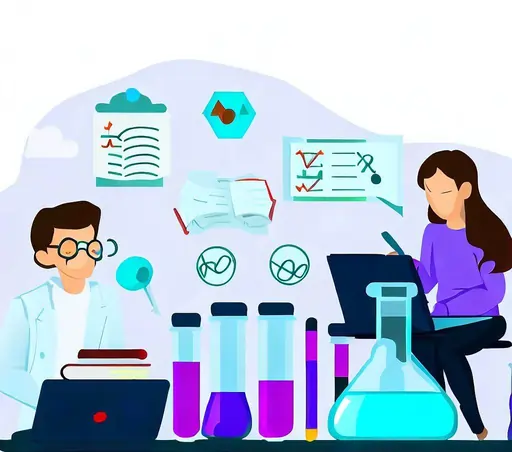Organize Your Study Space
Creating an organized study space is a fundamental step in effective exam preparation. A clutter-free and well-lit environment promotes focus and reduces distractions, enabling you to concentrate on the subject matter. Ensure all necessary study materials are within reach, enhancing efficiency. A tidy space also minimizes stress and anxiety, making your study sessions more productive and enjoyable. In essence, organizing your study space sets the stage for successful chemistry exam preparation.

Here's what you should consider:
- Quiet and Comfortable: A quiet and comfortable study space is essential for optimal concentration. Eliminating external disturbances and finding a peaceful atmosphere can significantly enhance your ability to absorb and retain information. Comfort also ensures longer, more productive study sessions. It's the foundation for effective learning, allowing you to delve into complex chemistry concepts with ease, making it a vital aspect of your exam preparation routine.
- Good Lighting: Good lighting is crucial for productive study sessions. Proper illumination reduces eye strain and enhances concentration. Dim or inadequate lighting can lead to fatigue and decreased comprehension. When preparing for your chemistry exam, ensure your study area is well-lit to optimize your learning experience. Bright lighting will help you absorb and retain the complex chemical concepts effectively.
- Materials: Having the right materials on hand is essential for productive chemistry exam preparation. Ensure you gather your textbooks, class notes, stationery, and any online resources you may need. Having all these materials at your fingertips minimizes disruptions during study sessions and enables seamless transitions between topics. With the right materials readily available, you can focus entirely on understanding and mastering the subject matter, increasing your chances of success on exam day.
Review the Syllabus and Exam Format
Reviewing the syllabus and understanding the exam format are pivotal for success in your chemistry exam. The syllabus provides a roadmap of what topics to focus on, ensuring you don't waste time on irrelevant material. Understanding the exam format helps tailor your study strategy, whether it's multiple-choice, essay questions, or a mix. This insight allows you to allocate your time and resources effectively, increasing your chances of acing the chemistry exam.
Start by:
- Reviewing the Syllabus: Reviewing the syllabus is your compass for chemistry exam preparation. It's your comprehensive guide to what the exam will cover, ensuring you don't miss any essential topics. By carefully going through the syllabus, you can prioritize your study efforts, focusing on the most critical areas and allocating your time wisely. This proactive approach helps you build a strong foundation and confidence in the subjects you'll be tested on, ultimately leading to a successful exam performance.
- Exam Format: Understanding the exam format is akin to having a treasure map in your hands. It guides your preparation journey. If your chemistry exam is multiple-choice, focus on mastering concepts for quick recall. For essay questions, emphasize deep understanding and critical thinking. Some exams combine both, requiring a balanced approach. Knowing the format helps you tailor your study techniques, allocate time wisely, and ensures you're well-prepared to tackle the specific challenges posed by your chemistry exam.
Create a Study Schedule
Creating a well-structured study schedule is the cornerstone of effective chemistry exam preparation. It provides a roadmap for your learning journey, breaking down your study time into manageable segments. With a schedule, you can allocate specific hours to each topic or subject, ensuring comprehensive coverage. Moreover, it helps prevent procrastination and last-minute cramming, promoting consistent learning. By following your study schedule diligently, you can systematically build your knowledge base, boost retention, and confidently take on your chemistry exam when the time comes.
Gather Study Materials
Gathering all your study materials is akin to assembling your arsenal before a battle. Ensure you have your textbooks, class notes, and any supplementary resources like online materials. Being well-equipped not only saves you valuable study time but also reduces frustration caused by scrambling to find necessary materials during your study sessions. It sets the foundation for organized and efficient chemistry exam preparation.
Necessary study materials include:
- Textbooks: Textbooks are your primary source of knowledge when preparing for your chemistry exam. They offer comprehensive coverage of the subject matter, making them indispensable for in-depth understanding. Ensure you have the required textbooks for your course and consider additional reference books for a broader perspective. When studying, focus on key chapters and exercises recommended by your instructor to make the most of your textbook resources.
- Class Notes: Class notes are your personalized study aids. They capture essential insights from your lectures and classroom discussions. Reviewing them helps reinforce what you've learned and ensures you don't miss critical points. Organize your class notes neatly, highlight key concepts, and add your personal remarks or questions for later review. These notes serve as valuable references during your chemistry exam preparation, facilitating a deeper understanding of the subject matter.
- Online Resources: Online resources are a valuable addition to your study toolkit. They provide access to a vast pool of knowledge, including video lectures, tutorials, and chemistry websites. These resources often offer alternative explanations and examples that can enhance your understanding of complex topics. Moreover, they enable flexibility, allowing you to study at your own pace and revisit challenging concepts as needed, making them an invaluable asset in your chemistry exam preparation.
Understand the Fundamentals
Understanding the fundamentals of chemistry is like building a solid foundation for a skyscraper. Before delving into complex topics, grasp the basics: the periodic table, chemical equations, and stoichiometry. This knowledge forms the bedrock upon which advanced concepts are built. Without a strong understanding of these fundamentals, tackling more intricate chemistry principles can be overwhelming. Investing time in mastering the basics sets you up for success in your chemistry exam.
Fundamentals include:
- Periodic Table: The periodic table is the cornerstone of chemistry, a roadmap to understanding the elements that make up our universe. Familiarizing yourself with it is akin to unlocking the secrets of matter. Learn about atomic numbers, atomic masses, and group trends. This knowledge forms the basis for comprehending chemical reactions, bonding, and properties of elements, which are critical for success in your chemistry exam. The periodic table is your essential guide in the world of chemistry.
- Chemical Equations: Chemical equations serve as the language of chemistry, enabling us to express and understand chemical reactions. They provide a concise representation of reactants and products, showing the transformation of substances during a reaction. Learning to balance chemical equations is crucial; it ensures the law of conservation of mass is upheld. Mastery of this fundamental skill equips you to interpret and solve various chemical problems effectively, a vital asset in your chemistry exam preparation.
- Stoichiometry: Stoichiometry, often considered the heart of chemistry, is a crucial concept to master. It deals with the quantitative relationships in chemical reactions. Understanding stoichiometry involves balancing chemical equations, calculating moles, mass, and volume relationships, and predicting reaction outcomes. Proficiency in stoichiometry empowers you to accurately quantify reactants and products, a skill invaluable for problem-solving in your chemistry exam and real-world chemical applications.
Master Key Concepts
Mastering key concepts in chemistry is akin to unlocking the door to success in your exam. Pay special attention to chemical bonding, types of chemical reactions, and properties of acids and bases. These are frequently tested and form the core of chemistry knowledge. Proficiency in these areas ensures you have a solid foundation to build upon and confidently tackle more advanced topics in your chemistry exam.
Practice Problem Solving
Problem-solving lies at the core of chemistry. Regular practice is key to honing this skill. Solve a plethora of practice problems from textbooks and online resources to develop your analytical and critical thinking abilities. These problems help solidify your understanding of concepts, making you better equipped to take your chemistry exam with confidence and precision.
To excel in this area:
- Work on Examples: Working on examples is a hands-on approach to mastering chemistry. It allows you to apply theoretical knowledge to practical scenarios, enhancing your problem-solving skills. By solving various examples, you become familiar with different problem types and gain confidence in your ability to tackle them. This practice not only reinforces your understanding of the subject but also equips you to handle similar questions effectively in your chemistry exam.
- Ask for Help: Don't hesitate to seek help when you encounter challenging topics. Chemistry can be intricate, and asking for assistance can provide clarity and a fresh perspective. Reach out to your teacher, classmates, or consider hiring a tutor if needed. Discussing complex concepts, asking questions, and getting clarification not only aids in understanding but also enhances your overall chemistry exam preparation and performance.
Create Study Aids
Creating study aids is a strategic move in your chemistry exam preparation. Flashcards, mind maps, and summaries are potent tools for reinforcing your understanding of key concepts. Flashcards help with quick recall of terms and equations. Mind maps visually connect related ideas, aiding in comprehensive comprehension. Summaries distill complex topics into concise, easy-to-review formats. These aids are your companions in mastering chemistry, facilitating efficient revision and boosting your exam readiness.
Take Mock Tests
Taking mock tests is a pivotal step in your chemistry exam preparation. Mock tests mimic the exam environment, providing a real-time assessment of your knowledge and readiness. They help you become familiar with the format, time constraints, and types of questions you'll face. Analyzing your performance on mock tests allows you to identify weak areas, refine your study strategy, and build confidence. It's a crucial tool to ensure you're fully prepared for the actual chemistry exam.
Exam Day Preparation
Efficient exam day preparation is the final sprint in your marathon of chemistry exam readiness. Arriving early is essential, as it offers time to relax and mentally prepare. Carefully reading the exam instructions ensures you follow them accurately. Allocate your time wisely, devoting more to sections you're confident in. Managing anxiety is key; deep breaths and a calm mindset will help you think clearly. By following these steps, you can take your chemistry exam day with confidence, fully prepared to excel.
Conclusion
Taking your chemistry exam can be a challenging endeavor, but by following this ultimate checklist for chemistry exam preparation, you can significantly improve your chances of success. Remember to organize your study space, understand the syllabus, create a study schedule, and focus on mastering key concepts. Practice problem-solving, take mock tests, and manage exam stress. With dedication and the right approach, you'll be well-prepared to tackle your chemistry exam confidently and excel in your academic pursuits.
